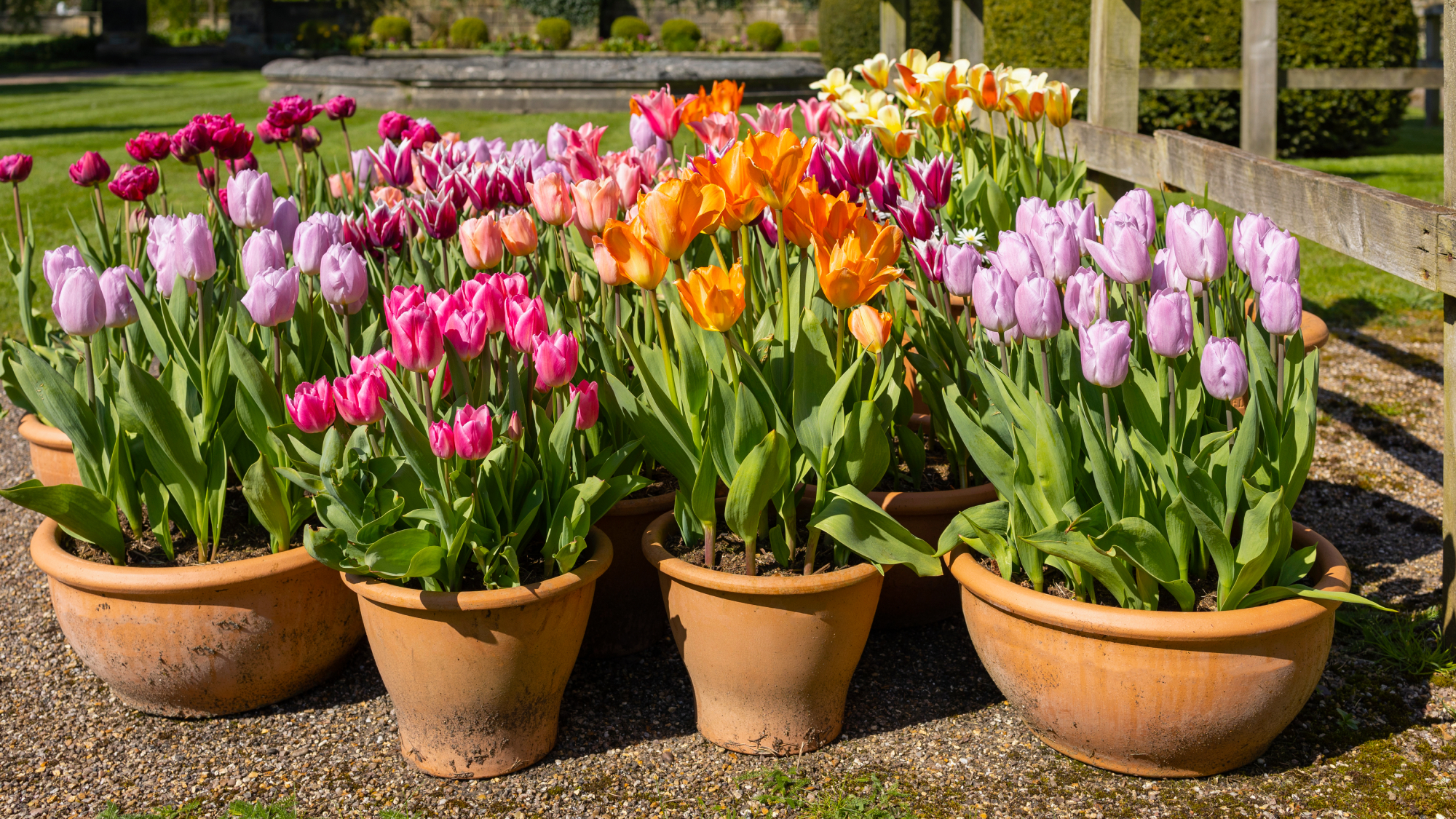
Sign up for the Gardening Know How newsletter today and receive a free copy of our e-book "How to Grow Delicious Tomatoes".
You are now subscribed
Your newsletter sign-up was successful
Containers aren't just for perennials and annuals. Planting tulips in pots can also make for a spectacular focal point in your spring garden. Mix them with some other spring-blooming bulbs or pansies when the spring thaw begins, and you'll have a gorgeous early season display.
But how do you plant and care for tulips in pots over winter to ensure they bloom next spring? I'll walk you through the basics of how to and when to plant tulips in pots, how to care for bulbs over winter, and answer some of the most common questions gardeners have about overwintering tulips.
Can You Plant Tulips in Pots?
Planting tulip bulbs in pots over winter is a great idea for small gardens or for people who enjoy container gardening. Not only does it create a beautiful potted arrangement you can use to brighten up your porch or patio, but it's also an ideal way to grow tulip bulbs.
Overwintering bulbs in containers allows you to easily protect plants from hard freezes, provides better drainage than planting in the ground, brings blooms closer to your house, and allows you to control the growing conditions.
Spring-flowering bulbs, like tulips, need a chilling period. So growing tulips in pots over winter will work well, as long as you live somewhere that gets cool winter temperatures. Bulbs need 10-14 weeks of exposure to temperatures between 35-45 degrees Fahrenheit (1.7-7.2 C°) in order to bloom. But tulips are tough bulbs that can easily tolerate temperatures down to 29 F° (-1 C°).
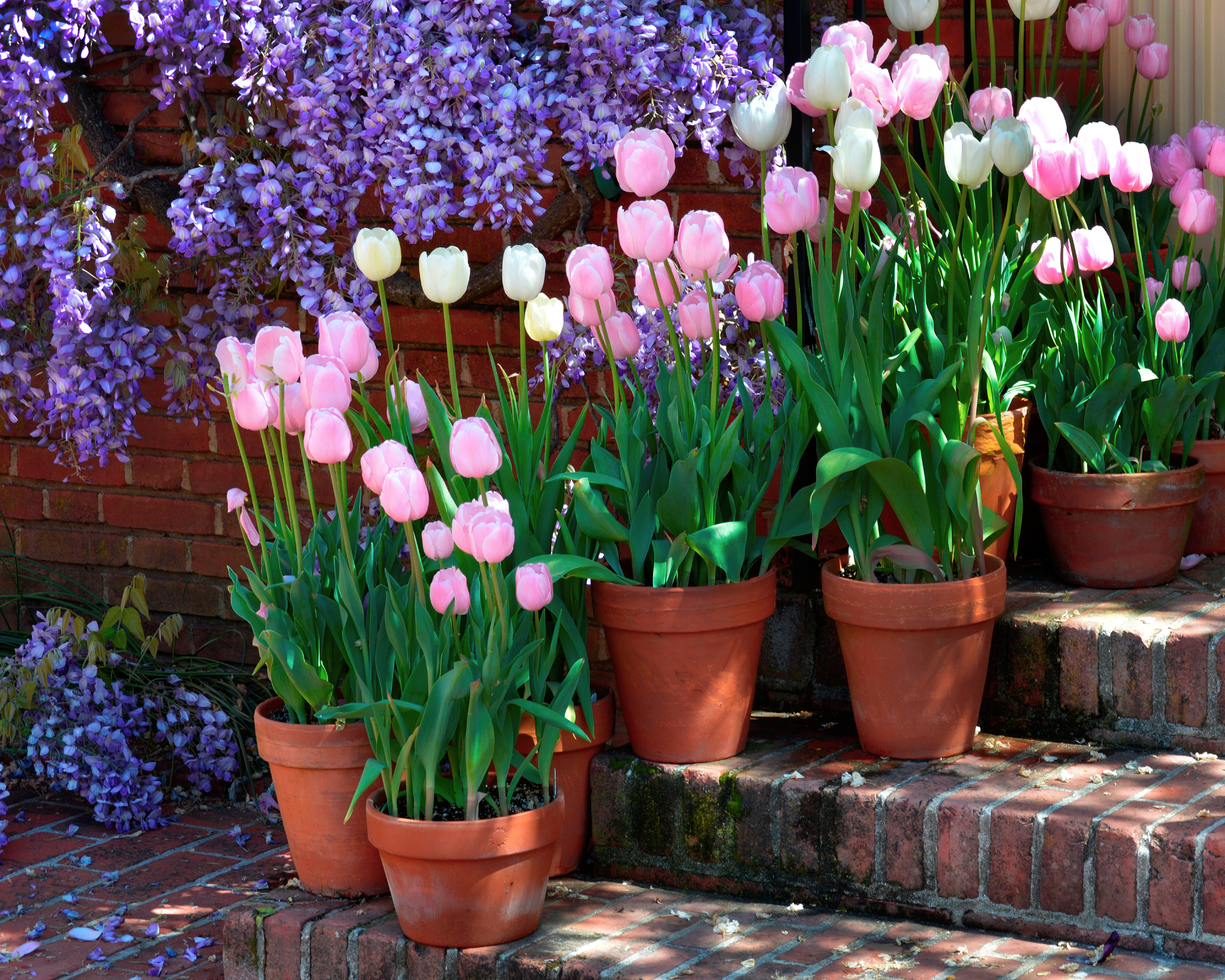
Tulips are hardy down to USDA growing zone 3, but if you live in a colder region you may need to take a few precautions. If you experience hard freezes all winter, keep containers in an unheated garage or similar location. Then move them outside when the temperatures begin to warm.
While bulbs bide their time outside in containers, they receive the chilling period necessary to break dormancy and sprout. Then in spring, you will have a beautiful display of blooms you can place on your porch for some early color.
Sign up for the Gardening Know How newsletter today and receive a free copy of our e-book "How to Grow Delicious Tomatoes".
When to Plant Tulips in Pots
The best time to plant bulbs in pots is in the fall. However, if your soil is already too frozen to dig or you just didn’t get around to planting your tulips, you can still do it in the winter. Just expect your flowers to bloom later than if they were planted in fall.
As a general rule, plant tulips in containers no later than January 1st. But as long as you have at least ten weeks of cold weather remaining, you can still plant.
If you would rather wait until the weather warms up, place the bulbs in the refrigerator. This will fool the bulbs into thinking they experienced winter and they will break dormancy when you plant them in spring. After ten weeks, plant them outside in prepared soil in a container that drains well.
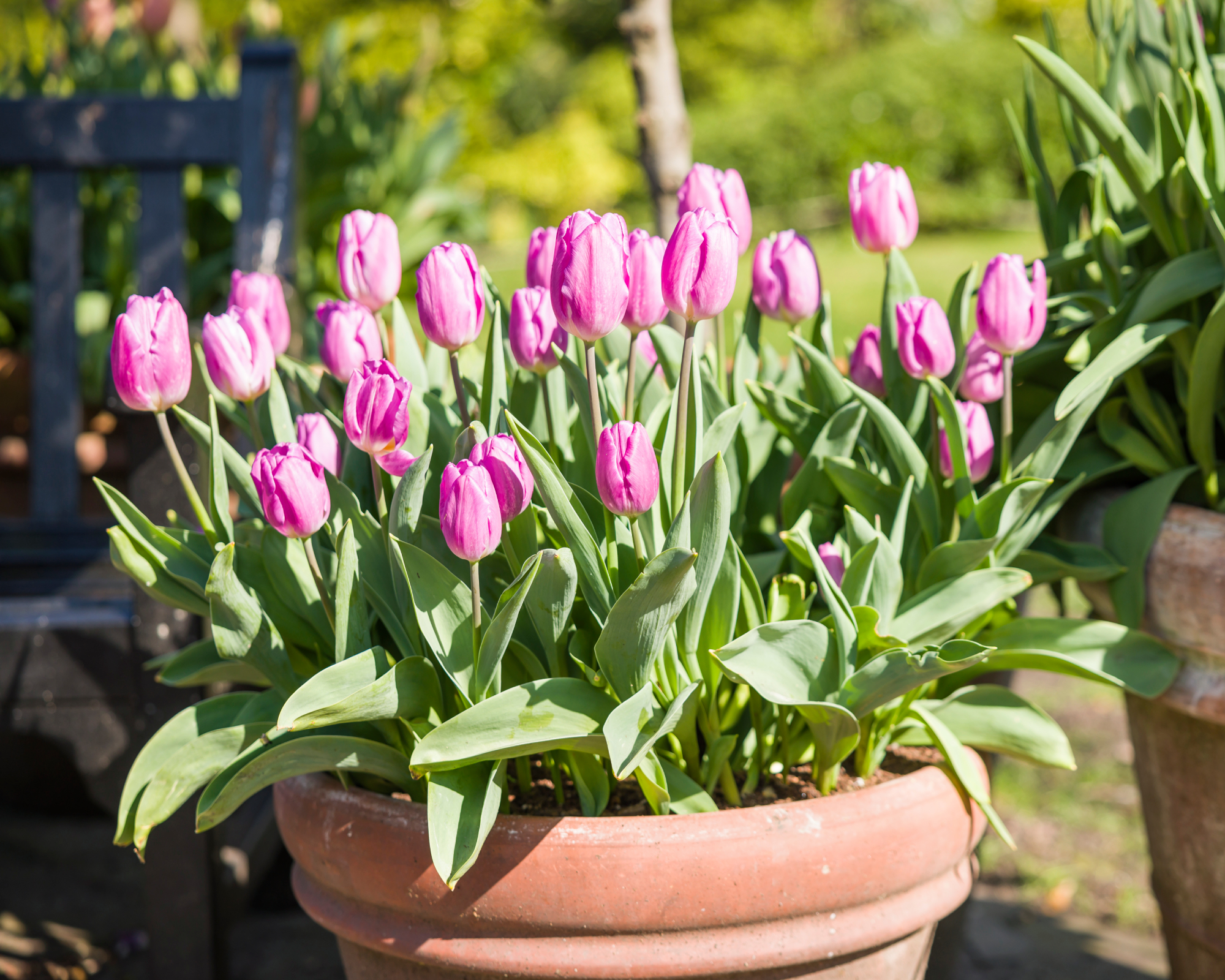
How to Plant Tulips in Pots
To plant tulips in pots, first select a container that is at least twice the planting depth of the bulbs. You should plant tulip bulbs around 6-8 inches (15-20 cm) deep, so a pot that is around 18 inches (46 cm) wide and 15 inches (38 cm) is ideal. This stylish modern pot from Amazon is all-weather resistant and the perfect size for planting tulip bulbs.
Use a good quality potting soil, like a bag of Miracle-Gro from Amazon. For even better drainage, you can mix in some coarse sand in a 1:3 ratio of sand to potting mix. This will provide superior drainage, especially if you live somewhere with a lot of winter precipitation.
Good drainage is extra important in the winter. Ice and wet kills more plants in the winter than the actual cold itself. So making sure the drainage in your containers is excellent is key. Always plant in a pot with drainage holes, especially when planting bulbs over winter. Water from melting snow or from routine watering can freeze and hurt your tulip bulbs, as well as rot them.
Some gardeners place rocks, bits of broken crockery, or other items at the bottom of the container to aid with drainage. But this isn’t necessary if you use a well-draining potting mix or add sand to the mixture.
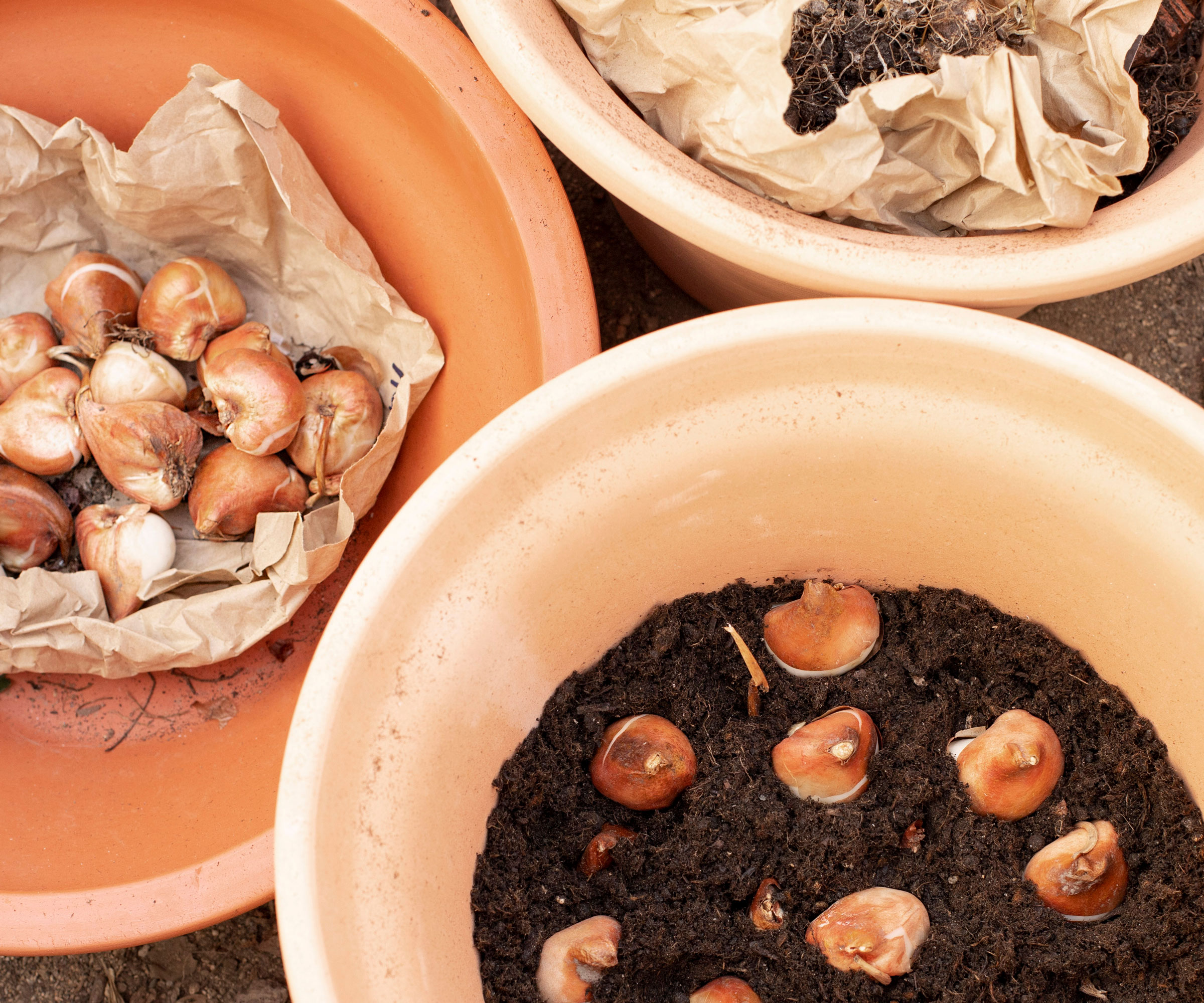
You can also incorporate bone meal, like this organic one from Espoma on Amazon, when you plant your pots. Plant the bulbs with the pointed side up and cover with potting mix. If you are planting a lot of bulbs, they should be close, but not touching. Water well to settle the soil.
While your tulips are growing and blooming in the spring, they are storing energy to help them survive the next winter. The more energy you can help them store, the more likely they are to survive.
In containers, tulip bulbs do not have as much opportunity to seek out external nutrients. You will be their only source of food, so make sure they have enough. In the winter, tulip bulbs do not need fertilizer. So hold off on fertilizing until the early spring when bulbs begin to grow. Then fertilize tulips with a bulb-specific fertilizer, like this one from Amazon, to give them all the nutrients they need.
Caring for Tulips in Pots Over Winter
Keep the soil around your tulip bulbs moist during the winter. Damp soil holds more heat than dry soil, so water tulips during winter can actually help protect bulbs from cold damage. Insert a finger 1 inch (2.5 cm) into the soil, and if it is dry, water lightly.
In colder climates, place a 2 inch (5 cm) layer of mulch over the top of the soil in your pots. When temperatures begin to warm, scrape this away to allow tender shoots to sprout more easily and to prevent moisture from holding in the soil too long.
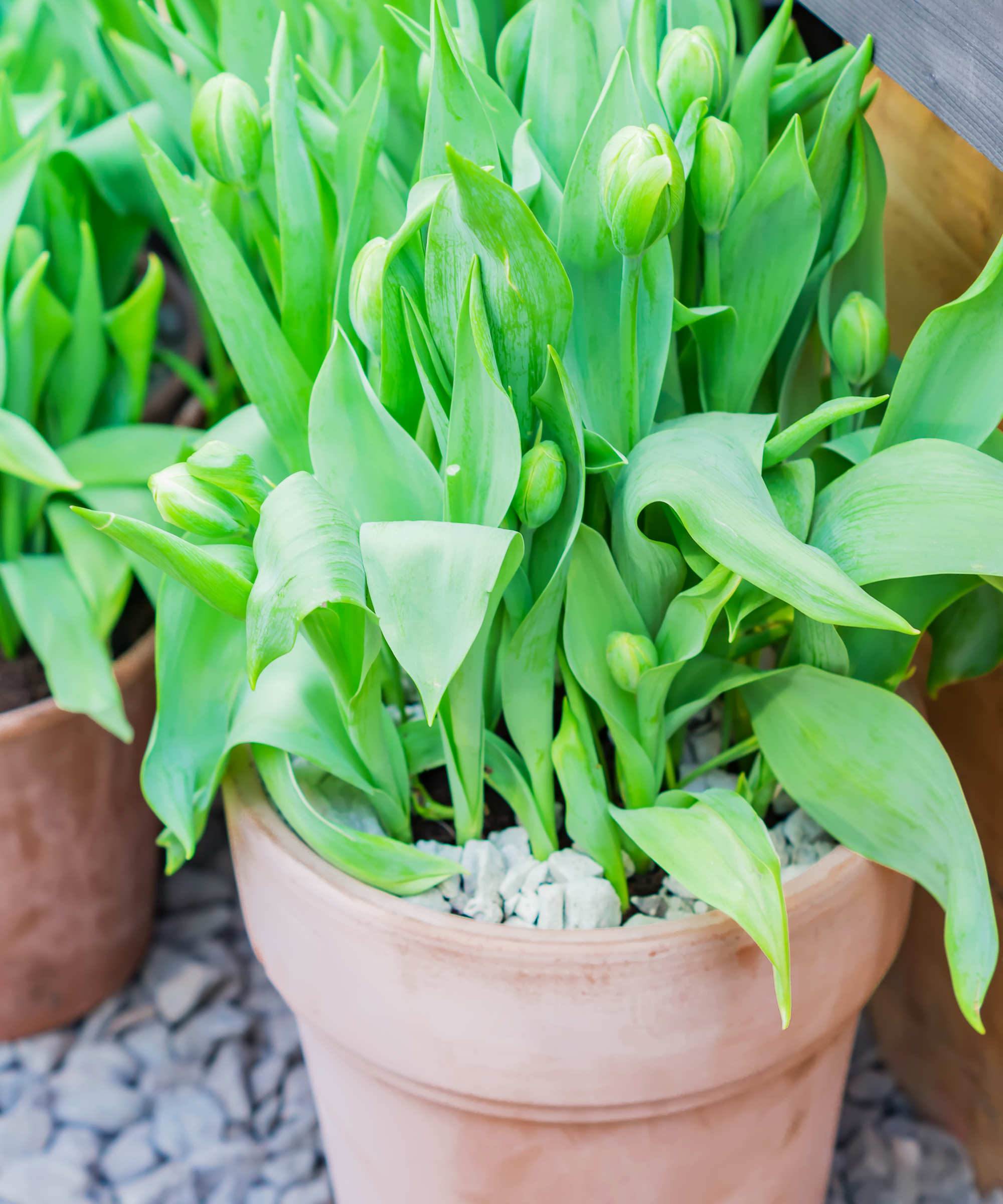
If hard freezes are a daily part of winter where you live, keep your containers in a cold frame, garage, shed, or other covered location. Another way to protect tulip bulbs in colder climates is to wrap bubble wrap or burlap, which you can get on Amazon, around the whole container. While your tulip bulbs will not need much water over the winter, they will need some moisture.
If you store tulip containers in a place where they will get snow (and water from melting snow), then you will need to water less often. But if there has been a lack of precipitation over the winter, you will need to occasionally water your tulip containers. If you need to provide water, then give containers a drink about once a month.
Frequently Asked Questions
Do tulips do better in pots or in the ground?
Both situations have their benefits but neither is better. If you want color bowls near the home, container gardening is perfect. If you want swaths of flowers in spring outside, they will be wonderful in the ground. The outdoor soil may take a bit of preparation to ensure proper tilth, nutrients, and drainage but the same is true of container soil. Containers under covered patios will need manual watering, while in-ground bulbs usually receive enough water from spring rainfall.
Can I plant potted tulips outside in the spring?
If you have purchased a forced tulip plant, wait until the bloom has faded and cut it off. Then move the foliage and bulb to a prepared site outside in spring. Let the foliage persist until it is yellow and dying back so the bulb can gather solar energy to fuel the next year’s blooms.
Do tulips in pots come back every year?
In most cases, tulips in pots can survive for years. And they will still produce new bulbs after a year, multiplying the display of flowers. These can be divided out when the container gets cramped and planted in fresh containers or outside.

Amy Grant has been gardening for 30 years and writing for 15. A professional chef and caterer, Amy's area of expertise is culinary gardening.
- Laura WaltersContent Editor
- Heather RhoadesFounder of Gardening Know How
